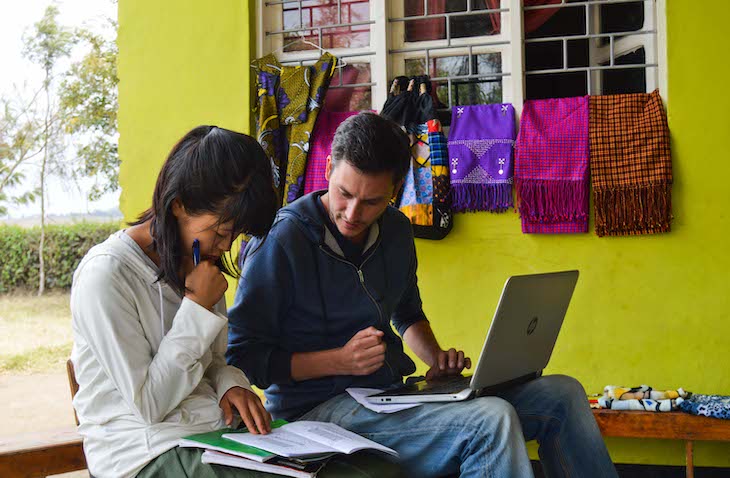In recent years, the landscape of work has undergone a significant transformation, driven by technological advancements and the increasing desire for flexibility among professionals. Amidst this shift, a new trend has emerged: remote work visas. These special visas, designed to attract digital nomads and remote workers, are being offered by countries worldwide.
This article delves into the rise of remote work visas, exploring the eligibility criteria and application processes, and offering valuable insights for those looking to combine their professional lives with the adventure of living abroad.
What is a Remote work visa?

A remote work visa, often referred to as a digital nomad visa, is a type of residency permit that allows individuals to live in a foreign country while working remotely for a company or clients based outside that country. This visa is designed specifically for digital nomads, freelancers, and remote employees who want to legally reside in a different country without the need to secure local employment.
Remote work visas typically come with specific requirements, such as proof of income, health insurance, and a valid passport. They are generally issued for a specified period, ranging from a few months to several years, and can often be renewed. The main goal of these visas is to attract foreign talent and stimulate local economies by allowing remote workers to spend their income in the host country.
Why do people seek Digital Nomad & Remote Work Visas?

People seek Digital Nomad and Remote Work Visas for a multitude of reasons, primarily driven by the allure of freedom and flexibility. These visas enable individuals to work from diverse and often idyllic locations, breaking free from the constraints of traditional office environments. For many, it’s an opportunity to immerse themselves in different cultures, experience new lifestyles, and foster a better work-life balance.
The ability to combine professional growth with personal exploration and adventure is a significant motivator, attracting a growing number of professionals to this nomadic lifestyle – especially those who love travel!
How is it different from a tourist visa?

While both remote work visas and tourist visas allow individuals to spend time in a foreign country temporarily, there are several key differences between the two:
Purpose:
- Tourist Visa: Primarily for short-term travel, sightseeing, and leisure activities. It does not permit the holder to engage in any form of employment, whether local or remote.
- Remote Work Visa: Specifically for individuals who intend to live in the country while working remotely for an employer or clients outside the host country.
Duration:
- Tourist Visa: Usually issued for short stays, often ranging from a few weeks to a few months, depending on the country’s regulations.
- Remote Work Visa: Typically valid for longer periods, from six months to several years, with the possibility of renewal.
Income Requirement:
- Tourist Visa: Generally does not require proof of income, although some countries may ask for proof of funds to cover the stay.
- Remote Work Visa: Requires proof of a stable income or savings to ensure the applicant can support themselves without local employment.
Work Authorization
- Tourist Visa: Strictly prohibits any kind of employment or business activities.
- Remote Work Visa: Explicitly allows the holder to work remotely for a foreign employer, making it legal to continue their professional activities while residing in the host country.
Legal Residency:
- Tourist Visa: Does not provide any pathway to legal residency or citizenship.
- Remote Work Visa: Some countries may offer pathways to extended residency or even citizenship for remote workers who meet certain criteria over time.
In summary, while a tourist visa is suitable for short-term travel and leisure, a remote work visa is tailored for those who wish to live abroad while maintaining their remote work lifestyle legally and sustainably.
Countries that offer remote work visas

Several countries have introduced digital nomad or remote working visas, offering opportunities for remote workers to live and work abroad. Here are some of the countries and the details of their digital nomad visa programs:
Europe
- Estonia: Allows remote workers to stay in Estonia for up to one year, catering to those who work online. Eligible applicants include employees of foreign-registered companies, freelancers with international clients, and business owners with companies registered abroad. Applications can be submitted at the nearest Estonian Embassy, with processing taking up to 30 days.
- Portugal: This visa allows non-EU/EEA/Swiss citizens to enjoy residency benefits, including travel within the Schengen Area, access to public healthcare, and a pathway to Portuguese citizenship. The D8 visa offers both short-term (up to one year) and renewable long-term (up to five years) stay options, requiring applicants to meet specific income, age, and criminal record criteria. Applications can be made at the nearest consulate, with further steps to obtain a residence permit.
- Germany: A digital nomad visa in Germany, typically issued as a freelance permit, allows remote work unconnected to German employers. This visa is ideal for professionals like artists, engineers, writers, and IT specialists, and permits a temporary stay. The freelance permit is obtainable in approximately five weeks.
- Spain: This visa allows foreigners to live in Spain as residents while working remotely for a foreign company or as self-employed. Applicants must have a prestigious undergraduate or postgraduate degree or at least three years of work experience. Eligible family members include spouses, partners, dependent children, and dependent relatives.

- Croatia: A digital nomad visa in Croatia allows non-EU/EEA/Swiss citizens to live and work remotely for foreign companies for up to one year, without performing services for Croatian employers. Applications can be submitted online or at Croatian embassies/consulates, and upon approval, biometric residence permits must be obtained and temporary residence registered within three days of arrival in Croatia.
- Norway: Norway’s digital nomad visa allows remote work only in Svalbard, an Arctic archipelago. While anyone can live and work in Svalbard without visa restrictions, those from countries needing a Schengen Visa must apply through Norway’s Directorate of Immigration (UDI). Applications can be submitted online or in person at a Norwegian embassy or consulate.
- Malta: The Nomad Residence Permit in Malta allows individuals to live in Malta while working remotely for foreign employers. It is available to non-EU nationals and is valid for one year and renewable. Applicants must be at least 18 years old and demonstrate remote work capability.

Americas
- Costa Rica: Costa Rica’s digital nomad program extends a 90-day tourist visa to a full year, renewable for another year. Digital nomads can open a national bank account, and use their home country’s driver’s license. This visa allows remote work for foreign companies and offers the opportunity to enjoy Costa Rica’s “pura vida” lifestyle.
- Belize: Belize’s “Work Where You Vacation” program offers remote workers the chance to live and work for six months. Participants can enjoy waived work permits, and enroll their children in Belize’s excellent schools.

- Panama: Panama offers a Short Stay Visa for Remote Workers, allowing foreign nationals to work remotely for up to nine months, extendable once. Eligible applicants must have a contract with a foreign company or be self-employed. This visa also allows family members to join under specific conditions.
Asia and the Middle East
- Dubai (UAE): Dubai’s one-year virtual working program invites remote workers to live and work in the city. The program includes access to local services such as telecoms, utilities, and schooling. Applications are processed by the General Directorate of Residency and Foreigners Affairs – Dubai (GDRFAD), and you can apply from the UAE or overseas through the GDFRA portal.
- Japan: Japan’s specified visa for designated activities allows digital nomads and their families to stay and work remotely in Japan for up to six months. Family members must provide documents proving their relationship and insurance coverage.

- South Korea: The Digital Nomad “Workcation” Visa allows foreigners to live and work remotely in Korea for up to one year. To be eligible, you must be a non-Korean citizen affiliated with an international company, meet the required minimum work experience and income, and be able to work remotely.
- Malaysia: Malaysia welcomes digital nomads with the DE Rantau program, offering a Digital Nomad Pass for stays of 3 to 12 months, renewable for an additional year. The pass allows digital professionals and non-tech talents to work and live in Malaysia with their families.
How to Apply for A Digital Nomad Visa
Applying for a digital nomad visa generally involves a few key steps, which may vary depending on the country.

Here’s a typical process:
- Check Eligibility Requirements: Ensure you meet the minimum income requirements and have valid health insurance, and any other specific criteria set by the country.
- Gather Necessary Documents: This often includes proof of income, a valid passport, health insurance documentation, and sometimes a background check or proof of accommodation.
- Fill Out the Application Form: Most countries offer online applications, though some may require you to submit forms in person or via mail.
- Pay the Application Fee: Fees vary by country and are usually non-refundable.
- Submit Your Application: Follow the specific instructions for submission, which may include mailing your application, uploading documents online, or visiting an embassy or consulate.
- Wait for Approval: Processing times vary; some countries may take a few weeks, while others could take several months.
- Receive Your Visa: Once approved, you’ll receive your visa, which allows you to legally reside and work in the country for the duration specified.
Alternatives to Remote Work Visas

While digital nomad visas offer a tailored solution for remote workers, there are other options to consider for those who just want the experience of living and working in a different country:
Internships
Securing an internship with a company abroad can provide a pathway to live and work in a different country, often leading to more permanent employment opportunities. Explore the following internship opportunities available worldwide!
































Munira Maricar · Travel Writer
With an international living background spanning Singapore, Qatar, Japan, and Mexico, Munira enjoys sharing insights on immersive travel while emphasizing the vital role of cultural respect and ethical engagement. Her extensive experience offers a unique perspective that inspires others to explore the world through service, ensuring that every journey respects and contributes positively to local traditions and communities.